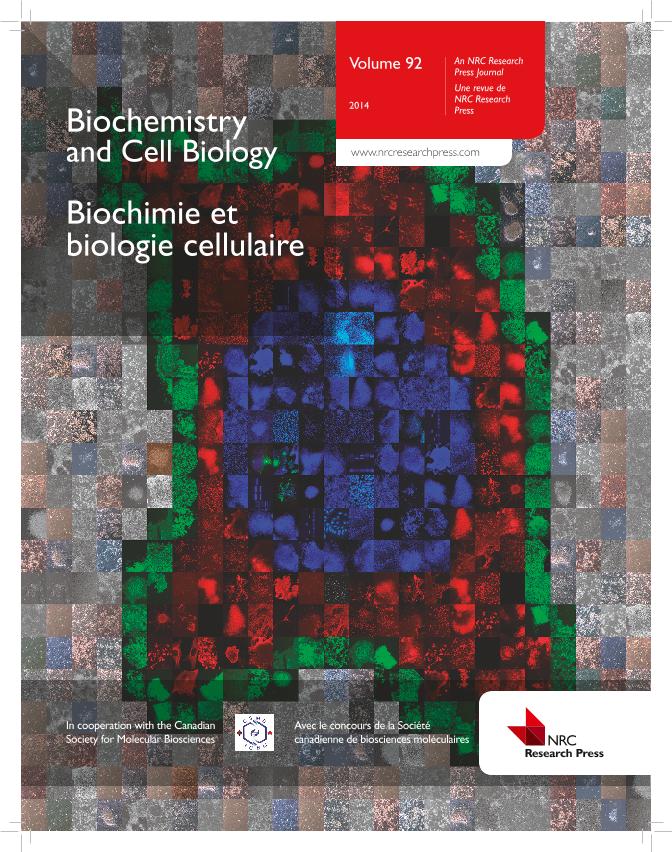Mostrar el registro sencillo del ítem
dc.contributor.author
Calvo, Natalia Graciela

dc.contributor.author
Martín, María Julia

dc.contributor.author
Russo, Ana Josefa

dc.contributor.author
Gentili, Claudia Rosana

dc.date.available
2016-07-15T14:08:50Z
dc.date.issued
2014-08
dc.identifier.citation
Calvo, Natalia Graciela; Martín, María Julia; Russo, Ana Josefa; Gentili, Claudia Rosana; Involvement of ERK1/2, p38 MAPK and PI3K/Akt signaling pathways in the regulation of cell cycle progression by PTHrP in colon adenocarcinoma cells; Royal Society of Canada; Biochemistry and Cell Biology; 92; 4; 8-2014; 305-315
dc.identifier.issn
0829-8211
dc.identifier.uri
http://hdl.handle.net/11336/6531
dc.description.abstract
Parathyroid Hormone-related Peptide (PTHrP) is distributed in most fetal and adult tissues and its expression correlates with the severity of colon carcinoma. Recently we obtained evidence that in Caco-2 cells, a cell line from human colorectal adenocarcinoma, exogenous PTHrP increases the number of live cells, via ERK1/2, p38 MAPK and PI3-kinase and induces the expression of cyclin D1, a cell cycle-regulatory protein. In this study, we further investigated the role of PTHrP in the regulation of the cell cycle progression in these intestinal cells. Flow cytometry analysis revealed that PTHrP treatment diminishes the number of cells in the G0/G1 phase and increases the number in both, S and G2/M phases. The hormone increases the expression of CDK6 and diminishes the amount of negative cell cycle regulators p27Kip1, p15INK4B and p53. However, PTHrP does not modify the expression of cyclin D3, CDK4 and p16INK4A. In addition, inhibitors of ERK1/2 (PD98059), p38 MAPK (SB203580) and PI3Kinase (LY294002) reversed PTHrP response in Caco-2 cells. Taken together, our results suggest that PTHrP positively modulates cell cycle progression and changes the expression of proteins involved in cell cycle regulation via ERK1/2, p38 MAPK and PI3K signaling pathways in Caco-2 cells.
dc.description.abstract
Le peptide apparenté a` l’hormone parathyroïdienne (PTHrP, acronyme de Parathyroid Hormone-related Peptide) est distribué dans la plupart des tissus foetaux et adultes, et son expression est corrélée avec la sévérité du carcinome du côlon. Récemment, les auteurs ont obtenu des indications que chez les cellules Caco-2, une lignée cellulaire humaine d’adénocarcinome colorectal, le PTHrP exogène accroit le nombre de cellules vivantes par l’intermédiaire de ERK1/2, de la p38 MAPK et de la PI3-kinase, et induit l’expression de la cycline D1, une protéine régulatrice du cycle cellulaire. Dans cette étude, ils ont examiné de manière plus approfondie le rôle du PTHrP dans la régulation de la progression du cycle cellulaire chez ces cellules intestinales. L’analyse en cytométrie de flux a révélé que le traitement au PTHrP diminuait le nombre de cellules en G0/G1 et accroissait le nombre de cellules en S et en G2/M. L’hormone accroissait l’expression de CDK6 et diminuait la quantité de régulateurs négatifs du cycle cellulaire, p27Kip1, p15INK4B et p53. Cependant, le PTHrP ne modifiait pas l’expression de la cycline D3, de CDK4 et de p16INK4B. De plus, les inhibiteurs de ERK1/2 (PD98059), de la p38 MAPK (SB203580) et de la PI3-kinase (LY294002) renversaient la réponse des cellules Caco-2 au PTHrP. Dans l’ensemble, ces résultats suggèrent que le PTHrP module positivement la progression du cycle cellulaire et modifie l’expression de protéines impliquées dans la régulation du cycle cellulaire par l’intermédiaire des voies de signalisation de ERK1/2, de la p38 MAPK et de la PI3-kinase chez les cellules Caco-2.
dc.format
application/pdf
dc.language.iso
eng
dc.publisher
Royal Society of Canada
dc.rights
info:eu-repo/semantics/openAccess
dc.rights.uri
https://creativecommons.org/licenses/by-nc-sa/2.5/ar/
dc.subject
Pthrp
dc.subject
Colon
dc.subject
Cell Cycle
dc.subject
Signaling Pathways
dc.subject.classification
Bioquímica y Biología Molecular

dc.subject.classification
Ciencias Biológicas

dc.subject.classification
CIENCIAS NATURALES Y EXACTAS

dc.title
Involvement of ERK1/2, p38 MAPK and PI3K/Akt signaling pathways in the regulation of cell cycle progression by PTHrP in colon adenocarcinoma cells
dc.type
info:eu-repo/semantics/article
dc.type
info:ar-repo/semantics/artículo
dc.type
info:eu-repo/semantics/publishedVersion
dc.date.updated
2016-07-12T15:22:40Z
dc.journal.volume
92
dc.journal.number
4
dc.journal.pagination
305-315
dc.journal.pais
Canadá

dc.journal.ciudad
Otawa
dc.description.fil
Fil: Calvo, Natalia Graciela. Universidad Nacional del Sur. Departamento de Biología, Bioquímica y Farmacia. Laboratorio de Química Biológica; Argentina. Consejo Nacional de Investigaciones Cientificas y Tecnicas. Centro Cientifico Tecnológico Bahia Blanca. Instituto de Ciencias Biologicas y Biomedicas del Sur; Argentina
dc.description.fil
Fil: Martín, María Julia. Universidad Nacional del Sur. Departamento de Biología, Bioquímica y Farmacia. Laboratorio de Química Biológica; Argentina. Consejo Nacional de Investigaciones Cientificas y Tecnicas. Centro Cientifico Tecnológico Bahia Blanca. Instituto de Ciencias Biologicas y Biomedicas del Sur; Argentina
dc.description.fil
Fil: Russo, Ana Josefa. Universidad Nacional del Sur. Departamento de Biología, Bioquímica y Farmacia. Laboratorio de Química Biológica; Argentina. Consejo Nacional de Investigaciones Cientificas y Tecnicas. Centro Cientifico Tecnológico Bahia Blanca. Instituto de Ciencias Biologicas y Biomedicas del Sur; Argentina
dc.description.fil
Fil: Gentili, Claudia Rosana. Consejo Nacional de Investigaciones Cientificas y Tecnicas. Centro Cientifico Tecnológico Bahia Blanca. Instituto de Ciencias Biologicas y Biomedicas del Sur; Argentina
dc.journal.title
Biochemistry and Cell Biology

dc.relation.alternativeid
info:eu-repo/semantics/altIdentifier/doi/10.1139/bcb-2013-0106
dc.relation.alternativeid
info:eu-repo/semantics/altIdentifier/pmid/25051885
dc.relation.alternativeid
info:eu-repo/semantics/altIdentifier/doi/http://dx.doi.org/10.1139/bcb-2013-0106
dc.relation.alternativeid
info:eu-repo/semantics/altIdentifier/url/http://www.nrcresearchpress.com/doi/abs/10.1139/bcb-2013-0106
Archivos asociados
